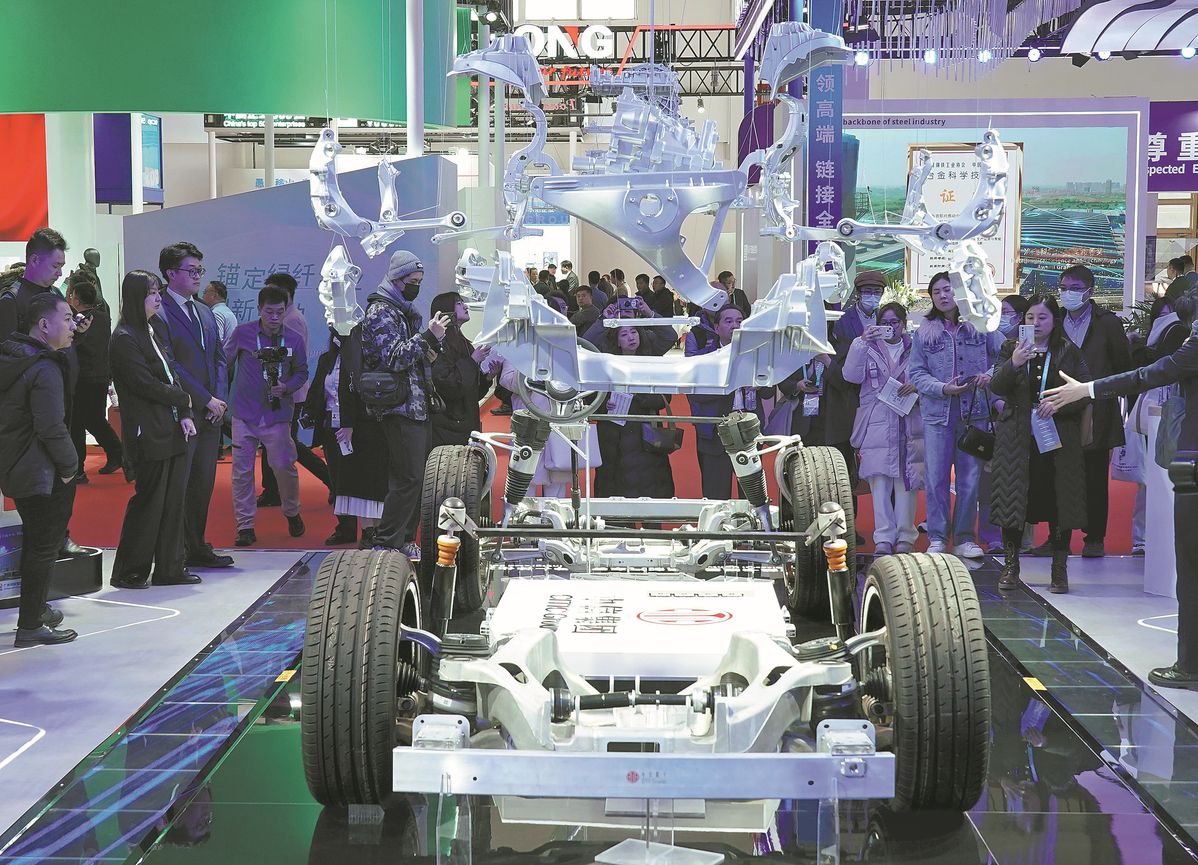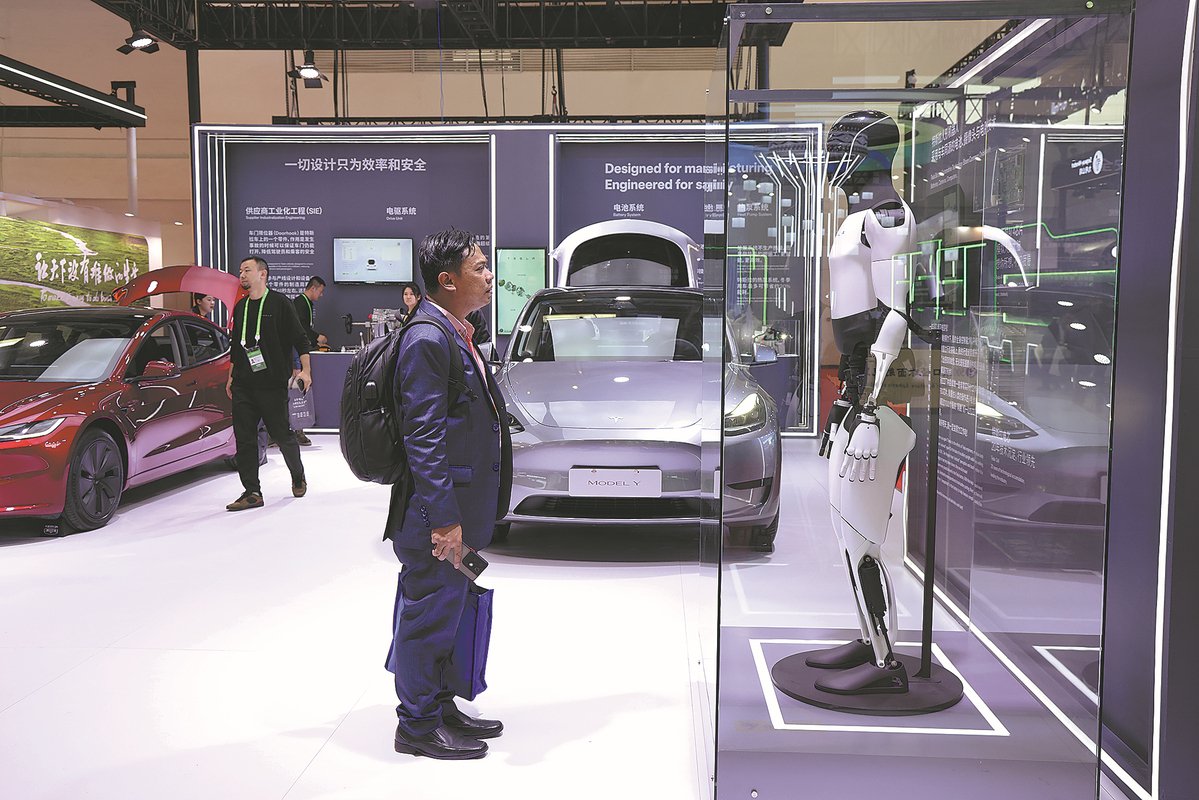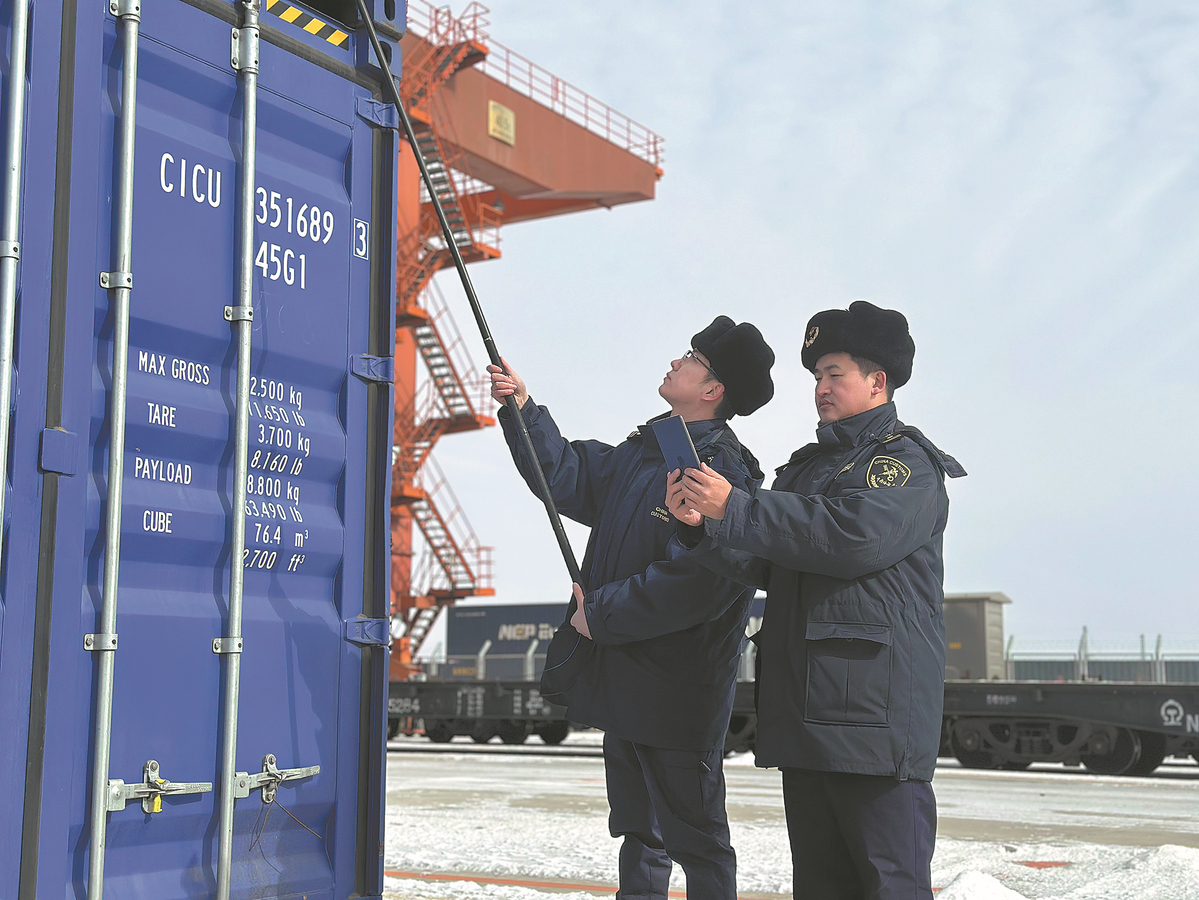Nation enhancing global cooperation in logistics sector to lower business costs, improve yield efficiency

In early December, Meng Xiangyu, a manager at Liaoning Chengzhi Trading Co Ltd, a Shenyang-based freight forwarder, was standing next to a cargo train at the Shenyang assembly center for the China-Europe freight train services in Northeast China's Liaoning province and directing workers to load containers filled with ski boots and skis onto the train with 45 freight cars.
Four hours later, at the sound of a whistle, the long-haul train bearing the logo of CR Express (China Railway Express), departed for Europe via the Manzhouli railway port located in Inner Mongolia autonomous region.
Upon arrival in Duisburg, Germany, the winter sports equipment and accessories will be distributed to retailers and ski resorts across Germany, Austria, Switzerland, Sweden and Norway within three days.
"This service ensures that our clients' ski products can efficiently and reliably reach over 20 European countries and more than 30 cities," Meng said.
From January to November, Liaozhong Customs, a branch of Shenyang Customs, had supported the export of winter sports economy-related goods, including ski equipment and down jackets worth 27.51 million yuan ($3.78 million).
Over 3,000 kilometers away, at the Pingxiang land port in Guangxi Zhuang autonomous region in southern China, long lines of trucks, heavily loaded with raw materials, intermediate goods, parts and accessories, drive into and out of Vietnam each day.
ALSO READ: Commemoration affirms success of 'one country, two systems'
These shipments, destined for factories of local and international companies in Vietnamese provinces like Binh Duong and Bac Ninh, originate from suppliers in South China's Pearl River Delta region.
These are just a few examples of how China's proactive measures and advanced industrial system have contributed to global supply chain collaboration, stimulated foreign trade and assisted neighboring countries in accelerating their pace of industrialization.
In the face of sluggish global economic growth, challenges posed by protectionist policies and geopolitical tensions, enhancing global supply chain cooperation has proved to be a pragmatic approach in lowering business costs, improving production efficiency and promoting shared development, said Yu Jianlong, vice-chairman of the Beijing-headquartered China Council for the Promotion of International Trade.
In recent years, certain Western countries have actively pursued strategies aimed at decoupling and disrupting supply chains, while promoting the "anti-globalization" and "de-globalization" agenda.
These actions have significantly disrupted the efficient global flow of production factors, impeded the optimal allocation of resources, and undermined the security and stability of global industrial and supply chains, said Yin Xiaopeng, dean of the Research Institute for Global Value Chains at the University of International Business and Economics in Beijing.

With China entering a new era of green and innovation-led growth, Yin said that the country's well-developed industrial system, logistics-related infrastructure and talent pool, free trade agreements with various partners, peaceful and huge market, will attract global companies to strengthen their supply chain in China.
For instance, European aircraft manufacturer Airbus has signed cooperation agreements with several domestic and foreign suppliers for production facilities in China this year, covering items from raw materials to equipment, in an effort to expand its supply chain in the country.
"The Chinese supply chain is an integral part of the global aviation industry, showing great resilience and competitiveness," said George Xu, Airbus' executive vice-president and CEO of Airbus China. At present, approximately 200 suppliers in China support the production of Airbus' commercial aircraft.
Brian McNamara, CEO of British multinational consumer healthcare group Haleon Plc, expressed a similar view.
"Innovations and capabilities developed in China can often extend to other countries, positioning China not only as a critical market for local success but also as a strategic hub for driving growth and competitiveness in international markets," he said.
READ MORE: China's air-passenger transport hits record high in 2024
The Weybridge, United Kingdom-headquartered group plans to complete the acquisition of all equity interest in Tianjin TSKF Pharmaceutical Co Ltd, its joint venture in China, from its local partners next year, after it raised its stake in Tianjin TSKF from 55 percent to 88 percent through an investment of 4.47 billion yuan earlier this year.
"This is our largest single investment in China to date, aimed at upgrading and modernizing our supply chain system within the country," said McNamara.
Backed by the most comprehensive range of industrial categories and the most complete supporting systems, China's manufacturing industry, based on United Nations standards, has maintained its position as the world's largest by scale for 14 consecutive years. The country accounts for over 30 percent of global output, according to information released at the second China International Supply Chain Expo by the CCPIT.
The grand event, held in Beijing in late November, attracted over 620 Chinese and foreign companies, such as China Baowu Steel Group, Rio Tinto, Siemens AG and Honeywell International Inc, marking a 20 percent increase in the number of exhibitors compared with the first edition. The proportion of overseas exhibitors climbed from 26 percent to 32 percent.
The second edition of the CISCE witnessed the signature of over 210 trade deals and tentative agreements totaling more than 152 billion yuan, up 1.3 percent from the inaugural expo, according to its organizer CCPIT.
Lin Meng, director of the modern supply chain research institute at the Beijing-based Chinese Academy of International Trade and Economic Cooperation, stressed that ensuring the stability of global supply chains is crucial for tackling challenges faced by businesses worldwide, including rising costs, geopolitical tensions and increasing protectionism. These factors could exacerbate global inflation.
"As China climbs up the value chain, it has increasingly transitioned into an exporter rather than an importer of intermediate goods for manufacturers in other regions. This evolution boosts connectivity and further enhances the competitiveness of global supply chains," said Lin.
Echoing the sentiment, Poh-Yian Koh, senior vice-president of FedEx Express and president of FedEx China, said her company will continue to expand its service network into second- and third-tier cities in China while enhancing its portfolio of e-commerce solutions by providing services that combine competitive speed with attractive prices for Chinese e-tailers.

"Multilateral trade and economic globalization will continue to empower the growth of China's foreign trade and the internationalization of Chinese companies," she said.
As the world continues to emerge from unprecedented economic and supply chain challenges in recent years, working together for multilateral trade and inclusive globalization is vital to catalyzing progress, she added.
According to data from the National Bureau of Statistics, China contributed an average of 24.8 percent annually to global economic growth from 1979 to 2023, ranking first globally, with its economic dividends benefiting all countries.
Driven by surging demand for China's electromechanical products in overseas markets and ongoing improvements in trade structure and quality, China's foreign trade expanded by 4.9 percent year-on-year to 39.79 trillion yuan in the January-November period of 2024, statistics from the General Administration of Customs showed.
To further enhance its role as a key link in the global supply chain, facilitating the timely delivery of raw materials, intermediate goods and finished products to international markets, China adopted 16 measures in early December to optimize the business environment at its ports and streamline customs clearance processes for foreign trade companies.
READ MORE: Energy self-sufficiency rate reaches 85%
The government aims to cultivate new drivers of foreign trade growth and explore new opportunities. These measures will sustain the development of new foreign trade formats such as cross-border e-commerce and bonded maintenance, said Lin Shaobin, deputy director-general of the GAC's general operations department.
Lin said that the new measures also include facilitating faster Customs clearance for businesses, assisting companies in fully utilizing tax incentives and helping them reduce operational costs.
Currently, more than 630,000 domestic and foreign-invested companies in China are involved in import and export activities, serving as the driving force behind the country's efforts to expand its presence in international markets, said the GAC.
Drawn by China's key location in the Asia-Pacific regional market and robust supply chain capacity, about 51 percent of German companies plan to increase investments in China within the next two years, according to a survey published by the German Chamber of Commerce in China in early December.
Contact the writer at zhongnan@chinadaily.com.cn


